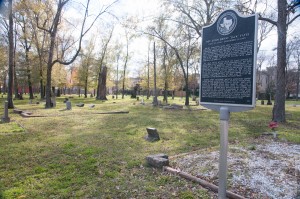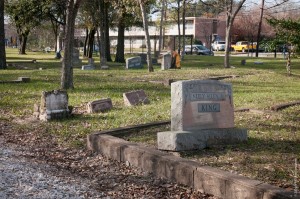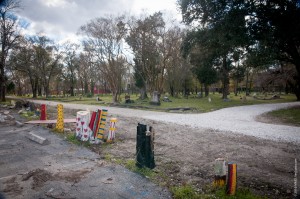Inside the Effort To Restore Montrose’s Historic African-American Cemetery
 For decades, Houstonians driving down West Dallas Street between Dunlavy and South Shepherd might have noticed an overgrown, apparently vacant lot on the south side of the street. Neglected by an absentee owner, the 5.5-acre site had become a weed-choked dumping ground, and probably seemed like a prime candidate for development. Few passing motorists would have guessed that beneath the trash and the dense underbrush was one of Houston’s most historically significant burial places.
For decades, Houstonians driving down West Dallas Street between Dunlavy and South Shepherd might have noticed an overgrown, apparently vacant lot on the south side of the street. Neglected by an absentee owner, the 5.5-acre site had become a weed-choked dumping ground, and probably seemed like a prime candidate for development. Few passing motorists would have guessed that beneath the trash and the dense underbrush was one of Houston’s most historically significant burial places.
Founded in 1896, the College Park Cemetery is one of Houston’s three remaining Jim Crow-era African-American cemeteries. (The other two are Olivewood, founded in the 1870s, and Evergreen, established in 1900.) It’s the final resting place of around 4,400 black Houstonians, including Reverend John Henry (Jack) Yates, arguably the single most important black leader in post-Civil War Houston, and the namesake of Jack Yates High School.
As fate would have it, Robert O. Robertson, the man who has spent the past 20 years leading the campaign to restore and beautify College Park, has a personal connection to Yates. Robertson is the pastor of Houston’s Bethel Missionary Baptist Church, which was founded by Yates in 1891 in historic Freedman’s Town (now the Fourth Ward). In the late 1990s Robertson was running a community service program for teenagers on probation. His office was on West Dallas, right across from an overgrown lot, so he decided to put his young charges to work cleaning up the property.
 When the teenagers began hacking through the weeds, they noticed a tombstone. Then another one. And another one. “When I came across the marker that said Reverend Jack Yates, I got a chill up my spine,” Robertson remembered. “I knew God had led me to that site.” Robertson began taking his probationers to the cemetery every weekend to clear brush and trash, and he started researching the cemetery’s history.
When the teenagers began hacking through the weeds, they noticed a tombstone. Then another one. And another one. “When I came across the marker that said Reverend Jack Yates, I got a chill up my spine,” Robertson remembered. “I knew God had led me to that site.” Robertson began taking his probationers to the cemetery every weekend to clear brush and trash, and he started researching the cemetery’s history.
He learned that the cemetery was named for its location across from the Houston Central College for Negroes, Houston’s first black school of higher education. He also learned that interred within its grounds was the president of that college, I. M. Terrell, who went on to serve as president of Prairie View State Normal and Industrial College (now Prairie View A&M) and administrator of the Houston Negro Hospital. Also buried on the grounds is a black Texas state legislator from the Reconstruction era—one of the last black legislators, it would turn out, until Barbara Jordan in the 1960s.
Not long after he began his cleanup efforts, Robertson had to fend off an attempt by developers to deconsecrate and sell a portion of the cemetery. With help from the city of Houston, Bethel purchased the land from its owner in 1998 and later established the College Park Cemetery Association, a non-profit organization that raises money to restore and maintain the property. Thanks to the church’s efforts, in 2002 the cemetery was designated a Texas State Historical Cemetery, which guarantees it can’t be torn down.
 Today, the cemetery looks nothing like the trash-strewn lot it used to be. There’s a handsome iron fence dividing it from the street and a shell-paved road winding through the grounds; most of the overturned tombstones have been set upright, and several historical markers provide information about the cemetery. More remains to be done—the cemetery needs a new drainage system, the grounds need to be mowed twice a month, and there are plans for a small prayer garden. The association is also trying to build an endowment to ensure the cemetery is cared for in perpetuity.
Today, the cemetery looks nothing like the trash-strewn lot it used to be. There’s a handsome iron fence dividing it from the street and a shell-paved road winding through the grounds; most of the overturned tombstones have been set upright, and several historical markers provide information about the cemetery. More remains to be done—the cemetery needs a new drainage system, the grounds need to be mowed twice a month, and there are plans for a small prayer garden. The association is also trying to build an endowment to ensure the cemetery is cared for in perpetuity.
More than anything else, Rev. Robertson said he wants Houston to begin giving the cemetery its proper respect. “February is Black History Month, and everyone wants to jump on the bandwagon, but we don’t pay attention to the place where these people are buried,” he said. “We say we honor Jack Yates, but we don’t honor his burial place. Martin Luther King has a beautiful place in Atlanta where he’s buried. But there were civil rights leaders before him—why not Jack Yates?”
College Park Cemetery, 3525 West Dallas Street
Tax-deductible donations to the College Park Cemetery Association can be made at collegeparkcemetery.net or mailed to College Park Cemetery Association, P.O. Box 130037, Houston, Texas 77219

Great article !! More people in Houston need to know about the black history of Houston. I live in 4th Ward and love the “little bit” of history I know. I am surprised that more money from the black community is not being funneled into honoring the past. Just look at Jack Yates house and the other black hero pioneers on Andrews and other streets. It amazes me the neglect.
Wonderful!! Go Rev. Robertson!